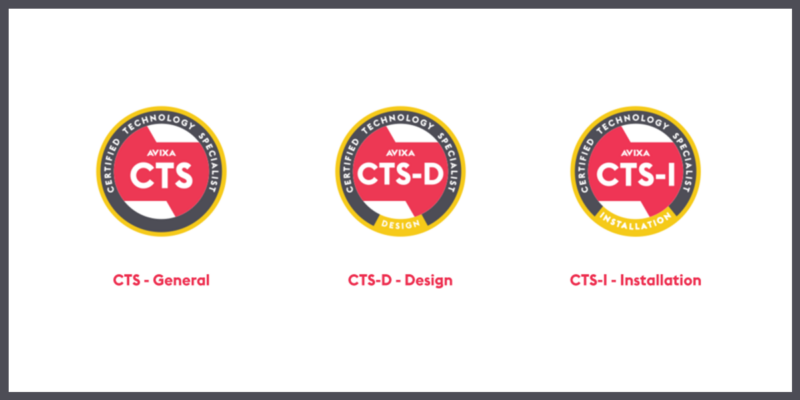What is the Value of CTS Today?
 There is an interesting discussion taking place on LinkedIn in the AV Industry Professionals Group. Sam Malik of Premier Mounts asked a great open ended question, “What is the Value of CTS Today?”
There is an interesting discussion taking place on LinkedIn in the AV Industry Professionals Group. Sam Malik of Premier Mounts asked a great open ended question, “What is the Value of CTS Today?”
As you can imagine, the responses vary, depending on what the respondent felt the word “certification” meant.
Some feel that it merely conveys a completion of an education base that relays commitment to acquiring at least basic industry knowledge.
Others like Ron Sauro of NWAA Labs felt that the term “certification” is loaded with “an assumption of competence that has not been necessarily tested and opens the organization up to legal liability if the task is not completed correctly…. on the grounds that the organization has “certified this persons competency.”
He goes on to say that,“CTS is such as “certification” …. if the people in our industry find the training useful and understand that no one is “certifying” this persons competency but only that the person has availed himself of some available training then CTS has value….But there really is no enforcement capability so it is therefore only voluntary. . .”
I think you know which side I fall on, and if not feel free to read my post from last month on CTS.
The overwhelming sentiment in that discussion seems to be that CTS as individual education is valuable and that continuing education is key to personal development and staying relevant in the industry.
The main counterpoints are that not all CEUs are equal, and some may choose courses that keep them on the cutting edge, while others choose those with little relevance, or ones that really do not promote personal growth. The other criticism was stated above, that “certified” carries a connotation of tried and true, and that InfoComm does not have any quality control mechanism for CTS certification as it pertains to real world performance over time.
As an aside to this discussion, I signed up for InfoComm’s University and took the CTS-D practice Exam, just to see what it covered and how I’d do. (I didn’t think it was fair to take the “General” practice exam given my tenure in the industry). I was sent the password at 10:10PM and I was done with the exam before 11PM, well before the allotted 3 hour time limit expired. I did not study or review course materials, I just signed in and launched the practice test.
Now, I have been in AV for 11 years, mostly on the sales and marketing side. I have taken only 2 classes at InfoComm and some others through manufacturers and I have never been CTS certified. I have always worked for small firms, and had to learn product on my own, do my own customer consultations, and then assemble my own systems, complete with connectors, etc. I know my way around the E-Sheets and Reflected Ceiling Plans rather well, and have read my share of RFIs, RFPs, and T&Cs so I expected I’d do well, but wasn’t sure.
I would have been worried if I had got a 100% under these circumstances, (no study, never been CTS certified, etc) and equally alarmed if I failed miserably. A 75 is a pass and I scored 88.3. The few I missed were not on technical items or drawings but on InfoComm’s definitions of Best Practices, which to be honest, I have never seen before. Again, this was just the practice exam, so I know the real exam would be different in some ways.
What conclusion do I draw from all this?
I think the practice exam was a rather good test of skill set, and I would expect an AV veteran to get a B+ on an AV pop quiz, such as the one I took. With some light study on InfoComm’s formulated Best Practices, a veteran system designer should get an A.
A newcomer wouldn’t have passed (nor should they), so I do think that InfoComm seems to set a fair bar on that exam.
My conclusion really hasn’t changed. I feel that CTS General Certification is a great start for industry newcomers, and that CTS-D and CTS-I could accelerate the learning curve for more complex jobs. I still feel that AV veterans worth their salt would pass these exams with little to no study depending on their role. (I won’t pretend to guess that I could pass the CTS-I as I haven’t installed a day in my life).
I still agree that the term “Certification” is loaded, and does confer some since of “tested and verified” when that is not the case. I continue to push InfoComm in that direction if they want to cement their value to the industry and the end user and eliminate future discussions on LinkedIn about the value of CTS.
Otherwise, maybe InfoComm could just change the vernacular from “CTS Certified” to “CTS Graduate” to convey the reality of it being education with no enforcement or tracking of real world performance.
I encourage all of you to go read the thread on LinkedIn and add your comments. Thanks to Sam Malik for stimulating some valuable conversation!





